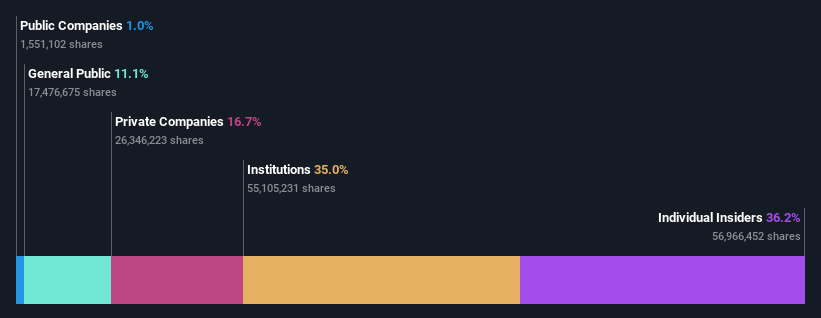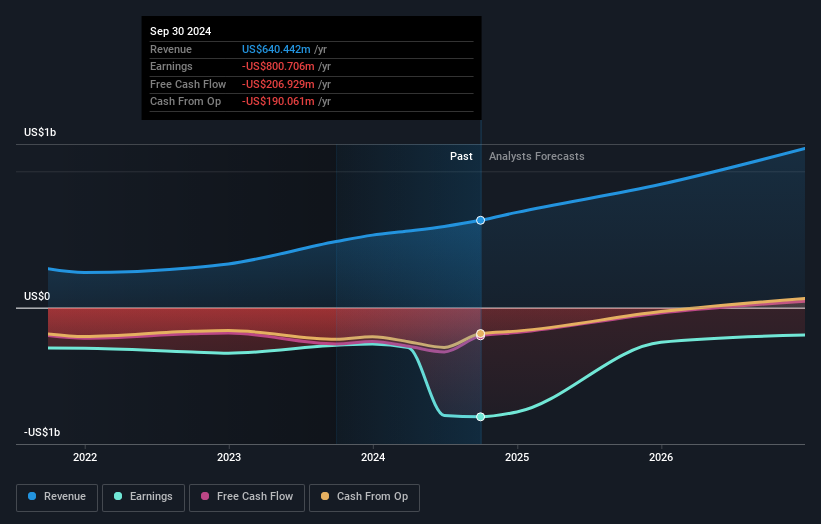- United States
- /
- Life Sciences
- /
- NasdaqGS:TEM
Insiders own 36% of Tempus AI, Inc (NASDAQ:TEM) in spite of selling recently and the recent dip may have hurt them

Key Insights
- Insiders appear to have a vested interest in Tempus AI's growth, as seen by their sizeable ownership
- 54% of the business is held by the top 4 shareholders
- Recent sales by insiders
If you want to know who really controls Tempus AI, Inc (NASDAQ:TEM), then you'll have to look at the makeup of its share registry. We can see that individual insiders own the lion's share in the company with 36% ownership. Put another way, the group faces the maximum upside potential (or downside risk).
And our data suggests that insiders own the top position in the company’s share registry despite recent sales. As market cap fell to US$6.6b last week, they would have faced the highest losses than any other shareholder groups of the company.
Let's delve deeper into each type of owner of Tempus AI, beginning with the chart below.
See our latest analysis for Tempus AI

What Does The Institutional Ownership Tell Us About Tempus AI?
Many institutions measure their performance against an index that approximates the local market. So they usually pay more attention to companies that are included in major indices.
As you can see, institutional investors have a fair amount of stake in Tempus AI. This implies the analysts working for those institutions have looked at the stock and they like it. But just like anyone else, they could be wrong. If multiple institutions change their view on a stock at the same time, you could see the share price drop fast. It's therefore worth looking at Tempus AI's earnings history below. Of course, the future is what really matters.

Hedge funds don't have many shares in Tempus AI. Looking at our data, we can see that the largest shareholder is the CEO Eric Lefkofsky with 24% of shares outstanding. The second and third largest shareholders are BK TL21 LLC and Kimberly Keywell, with an equal amount of shares to their name at 11%.
Our research also brought to light the fact that roughly 54% of the company is controlled by the top 4 shareholders suggesting that these owners wield significant influence on the business.
Researching institutional ownership is a good way to gauge and filter a stock's expected performance. The same can be achieved by studying analyst sentiments. There are a reasonable number of analysts covering the stock, so it might be useful to find out their aggregate view on the future.
Insider Ownership Of Tempus AI
While the precise definition of an insider can be subjective, almost everyone considers board members to be insiders. The company management answer to the board and the latter should represent the interests of shareholders. Notably, sometimes top-level managers are on the board themselves.
I generally consider insider ownership to be a good thing. However, on some occasions it makes it more difficult for other shareholders to hold the board accountable for decisions.
Our most recent data indicates that insiders own a reasonable proportion of Tempus AI, Inc. Insiders own US$2.4b worth of shares in the US$6.6b company. That's quite meaningful. It is good to see this level of investment. You can check here to see if those insiders have been buying recently.
General Public Ownership
The general public-- including retail investors -- own 11% stake in the company, and hence can't easily be ignored. This size of ownership, while considerable, may not be enough to change company policy if the decision is not in sync with other large shareholders.
Private Company Ownership
Our data indicates that Private Companies hold 17%, of the company's shares. It's hard to draw any conclusions from this fact alone, so its worth looking into who owns those private companies. Sometimes insiders or other related parties have an interest in shares in a public company through a separate private company.
Next Steps:
It's always worth thinking about the different groups who own shares in a company. But to understand Tempus AI better, we need to consider many other factors. Consider for instance, the ever-present spectre of investment risk. We've identified 3 warning signs with Tempus AI (at least 1 which makes us a bit uncomfortable) , and understanding them should be part of your investment process.
If you are like me, you may want to think about whether this company will grow or shrink. Luckily, you can check this free report showing analyst forecasts for its future.
NB: Figures in this article are calculated using data from the last twelve months, which refer to the 12-month period ending on the last date of the month the financial statement is dated. This may not be consistent with full year annual report figures.
Valuation is complex, but we're here to simplify it.
Discover if Tempus AI might be undervalued or overvalued with our detailed analysis, featuring fair value estimates, potential risks, dividends, insider trades, and its financial condition.
Access Free AnalysisHave feedback on this article? Concerned about the content? Get in touch with us directly. Alternatively, email editorial-team (at) simplywallst.com.
This article by Simply Wall St is general in nature. We provide commentary based on historical data and analyst forecasts only using an unbiased methodology and our articles are not intended to be financial advice. It does not constitute a recommendation to buy or sell any stock, and does not take account of your objectives, or your financial situation. We aim to bring you long-term focused analysis driven by fundamental data. Note that our analysis may not factor in the latest price-sensitive company announcements or qualitative material. Simply Wall St has no position in any stocks mentioned.
About NasdaqGS:TEM
Adequate balance sheet low.

